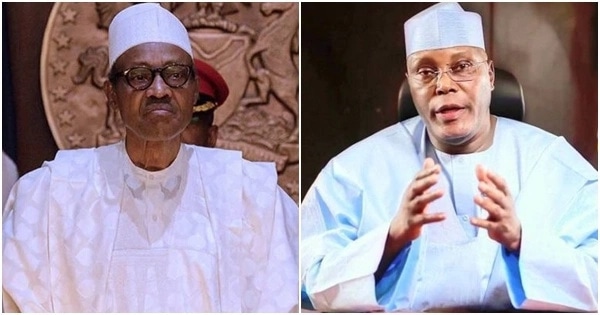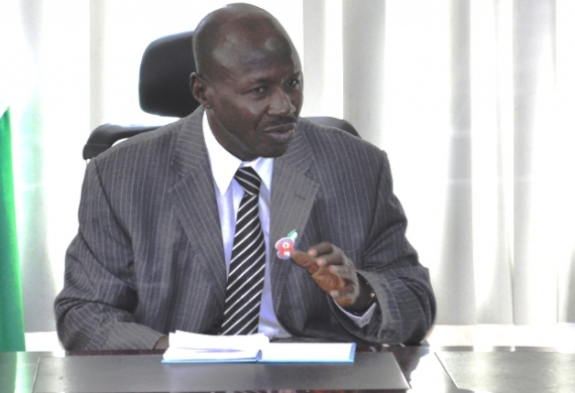Judgment day: Anxiety as Buhari, Atiku know fate today

The Presidential Election Petition Tribunal sitting in Abuja will today, September 11, deliver its judgment on the election petition filed by Atiku Abubakar and the Peoples Democratic Party (PDP) challenging the conduct of the February 23 general election won by President Muhammadu Buhari of the All Progressives Congress (APC).
Atiku Abubakar and the PDP had filed the petition on March 18 some days after the announcement of the election result and made the Independent National Electoral Commission (INEC) first respondent, Muhammadu Buhari, the second respondent and the All Progressives Congress (APC), the third respondent.
A five -man panel of justices of the Court of Appeal headed by Justice Mohammed Garba began to hear the petition on March 18.
It is expected that the tribunal will deliver not less than nine rulings that were reserved as agreed by the parties and the tribunal during the pre -hearing session of the petition.
These are the preliminary objections raised by the three respondents to the petition. While INEC has four objections, Buhari has three applications, just as the APC has three objections, but withdrew one of them.
The tribunal had on August 21 after the lead counsel to the parties had adopted their written submissions adjourned judgment to a date to be communicated to the parties which it fulfilled on Tuesday.
The petitioners, Atiku and PDP pointedly told the tribunal that President Buhari used fundamental falsehood to secure clearance from the INEC that enabled him participate in the poll.
Atiku in his final address insisted that Buhari, as candidate of the APC lied on oath in his form CF001 presented to INEC before standing for the presidential election.
His lead counsel, Dr. Levy Uzuokwu (SAN), drew the attention of the tribunal to a portion of Buhari’s INEC form where he claimed to have three different certificates; comprising primary school leaving certificate, WAEC certificate and officers’ cadet certificate.
The petitioners said it is shocking and surprising that “no provisional certificate, no certified true copy of the certificates, no photocopy of certificates and in fact, no electronic version of any of the certificates was presented by Buhari throughout the hearing of the petition to dispute the claim of the petitioners.
“More worrisome is the fact that Buhari’s own witness, Maj. Gen. Paul Tarfa (rtd), who joined the Nigerian Army with him in 1962 told the tribunal that they were never asked to submit their certificates to the Nigerian Army Board as claimed by Buhari in his form CF001.
“At any rate, the Secretary of the Nigerian Army Board, Olatunde Olaleye had in a statement clarified that Buhari had no single certificate in his personal file with the Nigerian Army,” he added.
Atiku therefore, urged the tribunal to nullify the participation of Buhari in the election on the grounds that Buhari lied on oath to deceive Nigerians and to secure unlawful qualification for the election.
The former Vice President informed the tribunal that the claim of Buhari that he can read and write in English Language as enough qualification for him is of no moment because ordinary artisans on the streets of Nigeria can also do so, adding that a grave allegation bordering on certificate is not addressed by Buhari as required by law.
The PDP presidential candidate also faulted the claim of INEC that it has no central server, adding that a server is a storage facility, including computer where database of registered voters, number of permanent voter card and election results amongst others are stored for references.
He said the claim by INEC that it has no device like server to store information, “is laughable, tragic and a story for the dogs.”
Atiku’s lawyer in the final address debunked the claim of INEC that collation and transmission of results electronically was prohibited by law in Nigeria.
He asserted that by Electoral Amendment Act of March 26, 2015, the use of electronics became law and was officially gazetted for the country, adding that section 9 of the Act which made provision for electronic collation of results replaced section 52 which hitherto prohibited the use of electronics and which INEC erroneously held on to that electronic results transmission is prohibited.
He, therefore, urged the tribunal to uphold the petition and nullify the participation of Buhari in the election on the grounds that he was not qualified to have stood for the election, in addition to malpractices that prompted his declaration as winner of the election.
On its part, INEC represented by Yunus Usman (SAN) urged the tribunal to dismiss the petition with substantial cost because the electoral body conducted the election in total compliance with the constitution and Electoral Act 2010 and urged the tribunal to dismiss the petition.
Usman insisted that INEC did not transmit election results electronically because doing so is prohibited by law and that the commission did not call any witness because there was no need to do so.
In his defence, President Muhammadu Buhari through his lead counsel, Chief Wole Olanipekun (SAN), argued that Atiku’s petition is liable to be dismissed because it is lacking in evidence, merit and substance and that the petition is ill-advised and signified nothing.
Olanipekun cited Section 131 of the constitution which stipulates a minimum of secondary school attendance to qualify for election in Nigeria, adding that Buhari cannot go beyond that and that he does not need to tender or attach certificate before he can get qualification for any election.
He averred that there is nothing in law to persuade the tribunal to nullify the February 23 presidential election as pleaded by Atiku and urged the tribunal to dismiss the petition with substantial cost.
The APC represented by Prince Lateef Fagbemi (SAN) in its own submission said the petition lacks quality evidence that can warrant the nullification of the election as pleaded by the petitioners and urged the tribunal to throw out the petition as long as its hand can do with huge costs.








